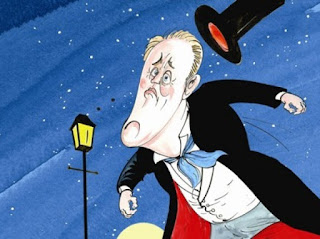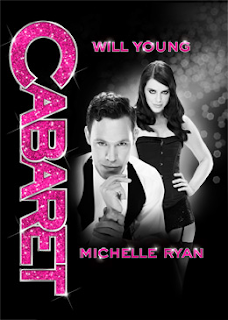Nichols’ partly autobiographical play about his days entertaining the troops during the Malayan Emergency – not a war, definitely not a war – depicts what happens when Steven Flowers, an inexperienced young private, joins SADUSEA (the Song and Dance Unit of South East Asia), half of whom are reputed “bum-boys.” Russell Beale’s Terri is the lead queen, brave and unapologetic about who he is, feminising everyone’s names with abandon (Clementina Attlee and so on) and raising an eyebrow at every even mildly suggestive remark. As well as being peppered with double-entendres, the language of Nichols’ play is riddled with off-hand racism – wogs, chinks and the like – and sexism, which though true to the time and the characters, doesn’t sit easy.
That said, the play is an intriguing portrait of the tail-end of empire: corruption and cynicism permeate, the air is thick with gin and mosquitos, and the senior ranks are suitably clueless while those lower down the ladder suffer the consequences. Bonds form between the men that may not have been possible at home, and the sense of camaraderie, closeness and even love that develops within the unit is gently conveyed. An attachment forms between John Marquez’s expletive-spitting Corporal Len Bonny and Harry Hepple’s Lance Corporal Charles Bishop, but tender as it is, it comes quite late in the day and, as such, it doesn’t have the emotional resonance it might.
The action is interspersed with songs, which are charismatically performed and invested with wit and charm by Russell Beale, but they’re essentially there to let Terri don yet another astonishing frock; very often they break up the narrative flow rather than moving things forward. While the standard of playing is decent enough, apart from SRB the only performance that really makes an impression is that of Angus Wright as the zealous and ever so gung-ho, Major Flack, who happily packs the men off to the jungle where danger awaits. He’s got a rich, sonorous voice of which Grandage makes full use, but when these two are off stage the pacing tends to dip and the production feels every minute of its near three hour running time. The first half in particular seems to take an age to play out.
The production looks beautiful – Christopher Oram’s set conveys a sense of decay and dilapidation, a sun-washed, crumbling space – but while the play’s structural bagginess can be read as a comment on the British presence in South East Asia, it becomes frustrating well before the end – what’s lacking is much in the way of Singapore grip. The silent servants who shadow the characters throughout – fetching their drinks, shouldering their abuse, biding their time – are shown in Grandage’s brief pay-off to get the last laugh, but instead of coming across as a final witty twist, there’s something ever so slightly sinister about the way this is framed: it leaves behind it a faintly sour taste.
The action is interspersed with songs, which are charismatically performed and invested with wit and charm by Russell Beale, but they’re essentially there to let Terri don yet another astonishing frock; very often they break up the narrative flow rather than moving things forward. While the standard of playing is decent enough, apart from SRB the only performance that really makes an impression is that of Angus Wright as the zealous and ever so gung-ho, Major Flack, who happily packs the men off to the jungle where danger awaits. He’s got a rich, sonorous voice of which Grandage makes full use, but when these two are off stage the pacing tends to dip and the production feels every minute of its near three hour running time. The first half in particular seems to take an age to play out.
The production looks beautiful – Christopher Oram’s set conveys a sense of decay and dilapidation, a sun-washed, crumbling space – but while the play’s structural bagginess can be read as a comment on the British presence in South East Asia, it becomes frustrating well before the end – what’s lacking is much in the way of Singapore grip. The silent servants who shadow the characters throughout – fetching their drinks, shouldering their abuse, biding their time – are shown in Grandage’s brief pay-off to get the last laugh, but instead of coming across as a final witty twist, there’s something ever so slightly sinister about the way this is framed: it leaves behind it a faintly sour taste.
Reviewed for Exeunt
























